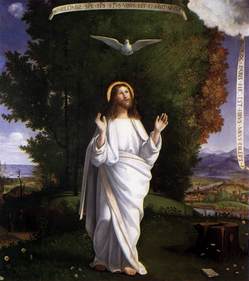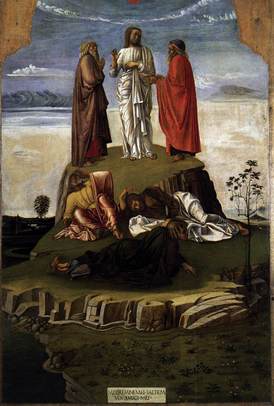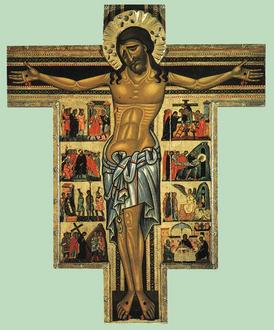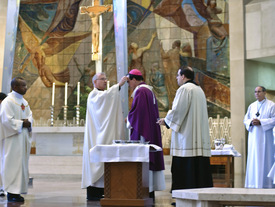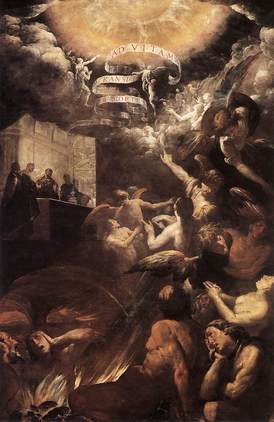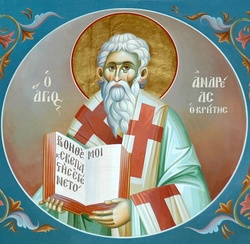
The last sentence of Pope Benedict's Wednesday audience today gives us a clue as to the reason why we begin a religious season of conversion, a yearly season of purification, he says: "40 days of intense prayer and sincere penance, to be able to celebrate, purified and completely renewed in mind and spirit, the great mystery of her Son's Easter." This is the point of ashes, penance, prayer, fasting, alms-giving--Easter!
The seminarians of Saint Joseph's Seminary --Dunwoodie, Yonkers, NY, returned to the seminary a couple of hours ago from being out all day imposing ashes on people at NYC churches: Saint Patrick's Cathedral, Saint Agnes, Our Lady of Victory and Our Lady of the Rosary. Seeming millions of people filtered through these churches. Certainly, Saint Patrick's saw 40-50 thousand people today and Saint Agnes (where I was with 5 other seminarians) saw about 7 thousand people come for ashes. It's tiresome to stand all day imposing ashes on gizilions of people repeating person-after-person the formula, "Remember that you are dust and dust you shall return." BUT it was good work for the Lord and for our sisters and brothers. On a personal note, I prayed my rosary and made my morning offering today for all the people upon whom I placed some ash as a token of the journey of conversion they've begun today by moving to the Last Supper, calvary and then unto empty tomb unto their salvation. The Pope's address today is another wonderful piece of practical theology moving us to the center of faith in Jesus Christ.
Today, Ash
Wednesday, we begin the Lenten journey: a journey that extends over 40 days and
that leads us to the joy of the Lord's Easter. We are not alone in this
spiritual itinerary, because the Church accompanies and sustains us from the
start with the Word of God, which encloses a program of spiritual life and
penitential commitment, and with the grace of the sacraments.
The words of the
Apostle Paul offer us a precise instruction: "Working together, then, we
appeal to you not to receive the grace of God in vain. For he says: 'In an
acceptable time I heard you, and on the day of salvation I helped you.' Behold,
now is a very acceptable time; behold, now is the day of salvation" (2
Corinthians 6:1-2). In fact, in the Christian vision of life every moment must
be called favorable and every day must be called the day of salvation. But the
liturgy of the Church refers these words in a very particular way to the time
of Lent. And that the 40 days of preparation for Easter be a favorable time and
grace we can understand precisely in the call that the austere rite of the
imposition of ashes addresses to us and which is expressed, in the liturgy,
with two formulae: "Repent and believe in the Gospel," and
"Remember man that thou art dust and unto dust thou shalt return."
The
first call is to conversion, a word that must be taken in its extraordinary
seriousness, discovering the amazing novelty it contains. The call to
conversion, in fact, uncovers and denounces the easy superficiality that very
often characterizes our way of living. To be converted means to change
direction along the way of life -- not for a slight adjustment, but a true and
total change of direction. Conversion is to go against the current, where the
"current" is a superficial lifestyle, inconsistent and illusory,
which often draws us, controls us and makes us slaves of evil, or in any case
prisoners of moral mediocrity. With conversion, instead, one aims to the lofty
measure of Christian life; we are entrusted to the living and personal Gospel,
which is Christ Jesus. His person is the final goal and the profound meaning of
conversion; he is the way which we are called to follow in life, allowing
ourselves to be illumined by his light and sustained by his strength that moves
our steps. In this way conversion manifests its most splendid and fascinating
face: It is not a simple moral decision to rectify our conduct of life, but it
is a decision of faith, which involves us wholly in profound communion with the
living and concrete person of Jesus.
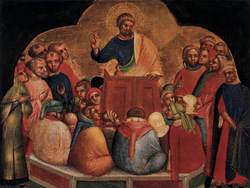
To be converted and to believe in the
Gospel are not two different things or in some way closely related, but rather,
they express the same reality. Conversion is the total "yes" of the
one who gives his own existence to the Gospel, responding freely to Christ, who
first offered himself to man as Way, Truth and Life, as the one who frees and
saves him. This is precisely the meaning of the first words with which,
according to the Evangelist Mark, Jesus began the preaching of the "Gospel
of God." "This is the time of fulfillment. The kingdom of God is at
hand. Repent, and believe in the Gospel" (Mark 1:15).
"Repent and
believe in the Gospel" is not only at the beginning of the Christian life,
but accompanies all its steps, [this call] remains, renewing itself, and
spreads, branching out in all its expressions. Every day is a favorable moment
of grace, because each day invites us to give ourselves to Jesus, to have
confidence in him, to remain in him, to share his style of life, to learn from
him true love, to follow him in daily fulfilling of the will of the Father, the
only great law of life -- every day, even when difficulties and toil,
exhaustion and falls are not lacking, even when we are tempted to abandon the
following of Christ and to shut ourselves in ourselves, in our egoism, without
realizing the need we have to open to the love of God in Christ, to live the
same logic of justice and love.
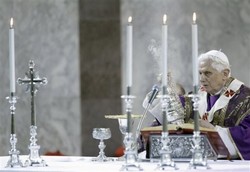
In the recent Message for Lent, I wished to
remind that "humility is required to accept that I need Another to free me
from 'what is mine,' to give me gratuitously 'what is his.' This happens
especially in the sacraments of reconciliation and the Eucharist. Thanks to
Christ's action, we may enter into the 'greatest' justice, which is that of
love (cf. Rm 13, 8-10), the justice that recognizes itself in every case more a
debtor than a creditor, because it has received more than could ever have been
expected" (L'Osservatore Romano, Feb. 5, 2010, p. 8).
The favorable moment
and grace of Lent shows us the very spiritual meaning also through the old
formula: "Remember man that thou art dust and unto dust thou shalt
return," which the priest pronounces when he places ashes on our head. We
are thus remitted to the beginning of human history, when the Lord said to Adam
after the original fault: "By the sweat of your face shall you get bread
to eat, Until you return to the ground, from which you were taken; For you are
dirt, and to dirt you shall return" (Genesis 3:19).
Here, the Word of God
reminds us of our frailty, including our death, which is the extreme expression
of our frailty. In face of the innate fear of the end, and even more so in the
context of a culture that in so many ways tends to censure the reality and the
human experience of dying, the Lenten liturgy on one hand reminds us of death,
inviting us to realism and to wisdom but, on the other hand, it drives us above
all to accept and live the unexpected novelty that the Christian faith
liberates us from the reality of death itself.
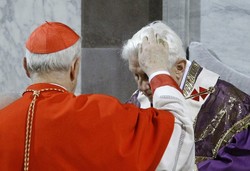
Man is dust and to dust he shall
return, but he is precious dust in God's eyes, because God created man for
immortality. Thus the liturgical formula "Remember man that thou art dust
and to dust thou shalt return" finds the fullness of its meaning in
reference to the new Adam, Christ. The Lord Jesus also wished to freely share
with every man the lot of frailty, in particular through his death on the
cross; but precisely this death, full of his love for the Father and for
humanity, has been the way for the glorious resurrection, through which Christ
has become the source of a grace given to those who believe in him and are made
participants of divine life itself. This life which will have no end is already
present in the earthly phase of our existence, but will be led to fulfillment
after the "resurrection of the flesh." The little gesture of the
imposition of ashes reveals to us the singular richness of its meaning: It is
an invitation to live the time of Lent as a more conscious and more intense
immersion in the Paschal Mystery of Christ, in his death and resurrection,
through participation in the Eucharist and in the life of charity, which stems
from the Eucharist and in which it finds its fulfillment. With the imposition
of ashes we renew our commitment to follow Jesus, to allow ourselves to be
transformed by his Paschal Mystery, to overcome evil and do good, to have the
"old man" in us die, the one linked to sin, and to have the "new
man" be born, transformed by the grace of God.
Dear friends! While we
hasten to undertake the austere Lenten journey, we want to invoke with
particular confidence the protection and help of the Virgin Mary. May she, the
first believer in Christ, be the one who accompanies us in these 40 days of
intense prayer and sincere penance, to be able to celebrate, purified and
completely renewed in mind and spirit, the great mystery of her Son's Easter.
Good
Lent to all!
